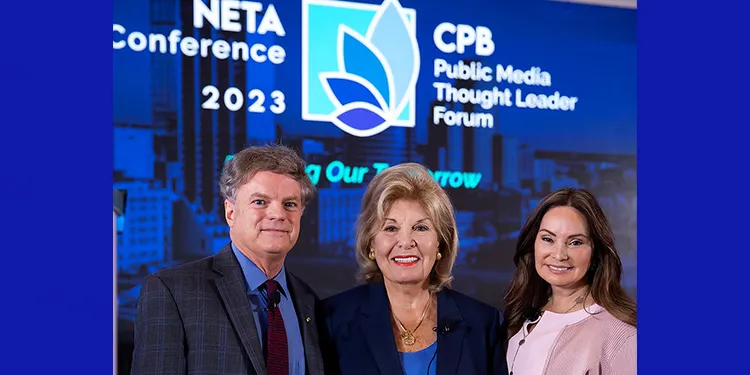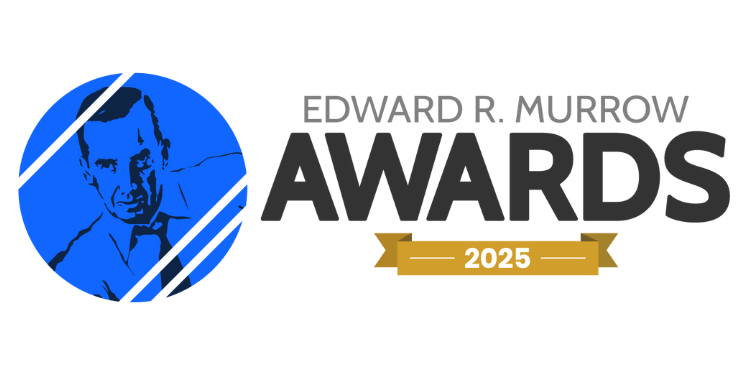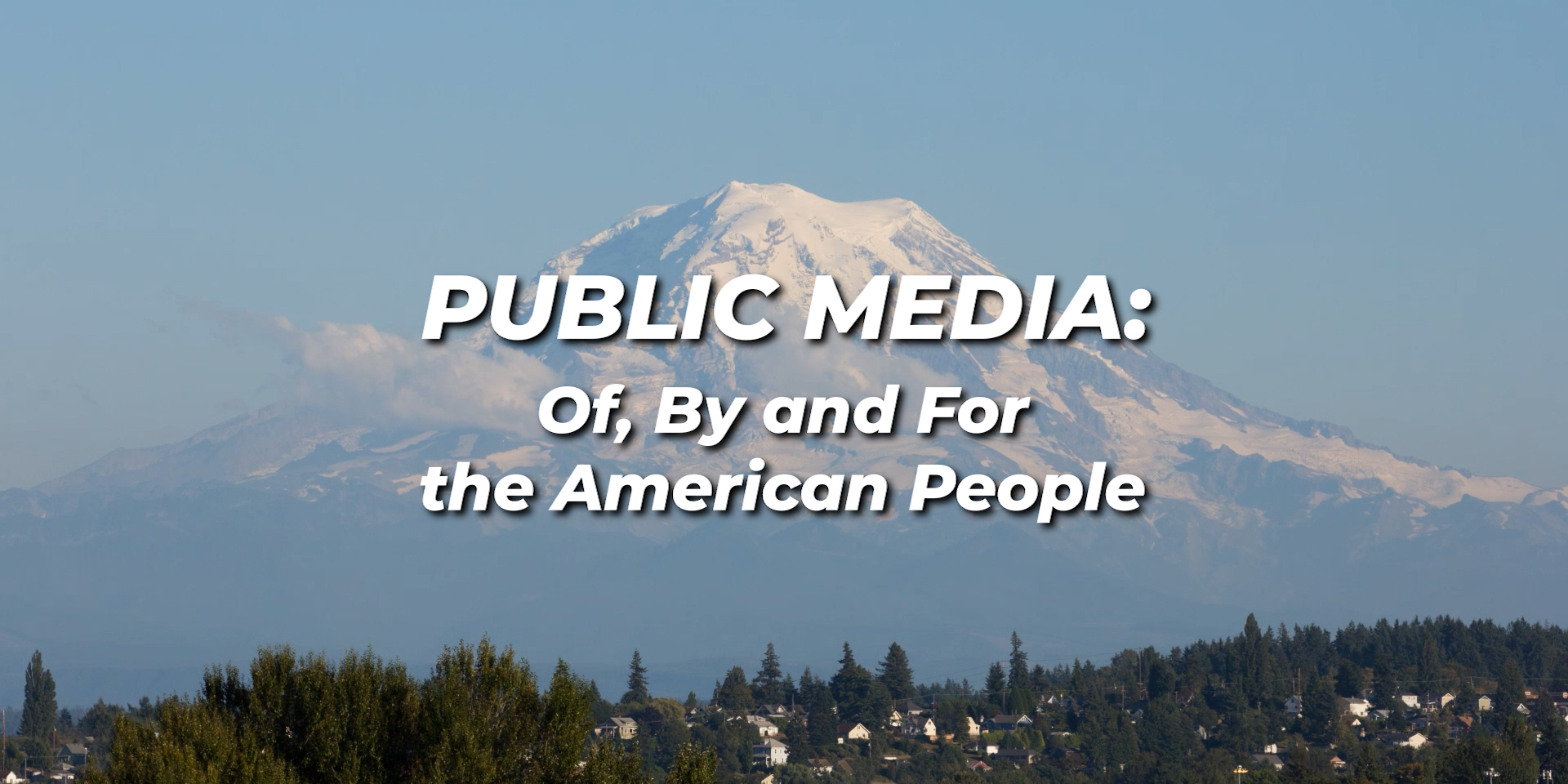September 14, 2023
Chief executives John Bridgeland (More Perfect), left, Patricia Harrison (CPB) and Rosie Rios (U.S. Semiquincentennial Commission) at the CPB Public Media Thought Leader Forum
As America approaches its 250th anniversary in 2026, the 2023 CPB Public Media Thought Leader Forum brought innovators and public media leaders together in Grand Rapids, Michigan, on September 11 to discuss public media’s role in strengthening our democracy and civil society.
“President John F. Kennedy said that ‘Democracy is never a final achievement. It is a call to an untiring effort.’ It is an effort that public media has been dedicated to since our beginning,” said CPB President and CEO Patricia Harrison. “Through our mission to ensure that all Americans have lifelong access to trusted content that educates and informs, we’re part of this never-ending approach to democracy.”
After the morning’s moment of silence to remember and honor the lives loss on the 22nd anniversary of the September 11, 2001, terrorist attacks, Harrison launched the day’s program by quoting Fred Rogers when he invites our youngest citizens to ask: “Won’t you be my neighbor?”
The daylong forum, held in person for nearly 500 public media professionals and hundreds more watching online, was the seventh Thought Leader Forum held in partnership with the National Educational Telecommunications Association (NETA). This year’s event featured speakers offering dynamic ideas on how public media can inspire a renewal of our democratic values and strengthen our civil society through engaging with communities as we approach the 250th anniversary of the founding of America.
Rosie Rios, chair of the U.S. Semiquincentennial Commission, addressed the power of memory. The collective memory of September 11 relies on storytelling, since a quarter of all Americans today are too young to remember the terrorist attacks or hadn't even born that day, she said. “Here’s a hard truth about memories: They’re like democracies, inherently flawed, and we don’t really understand how they work,” she said. “If humans aren’t hard-wired to remember every detail, we need public media platforms more than ever to help us make sense of the meaningful ones. We need you to tell powerful stories that add new depth to our perspectives. We need you to do what algorithm-driven content factories can’t: Expand and illuminate the undiscovered truths beneath our deepest memories.”
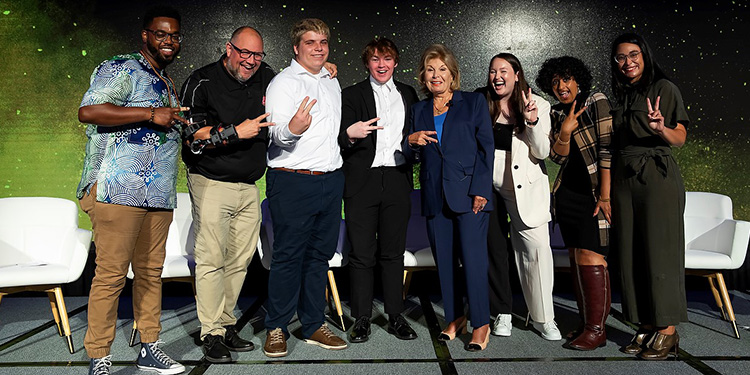
Engaging youth, from left, Ralph Bouquet (NOVA); Randy Scott, Cooper Austin and Kalob Hersh of Davison High School in Michigan; Patricia Harrison, CPB; Sophie Beren, The Conversationalist; Ashwak Alshabibi, Detroit Public Television; Ariel Alvarez, WNET.
John Bridgeland, co-chair and CEO of More Perfect, an initiative to help protect and renew our democracy, discussed the initiative’s five democracy goals and led a panel focused on one: universal civic learning. “In a democracy, citizen—not president, senator, or governor—is the highest office in the land. This extraordinary fact presents an opportunity to unleash the talent, entrepreneurial spirit, and creativity of Americans to solve tough challenges together,” he said.
With more states mandating civic education, public media station GBH in Boston has produced the U.S. History Collection, a comprehensive set of media-rich educational resources presenting history that is available for free to teachers nationwide on PBS LearningMedia. Panelist Seeta Pai, GBH’s executive director of education, said the collection, developed with CPB support, helps students develop critical thinking skills through interactive lessons such as a debate between W.E.B. DuBois and Booker T. Washington, asking students who had the better vision.
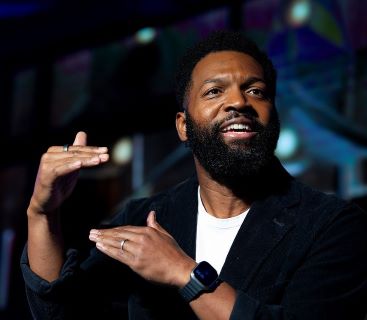
Baratunde Thurston
Public media stations can use the U.S. History Collection and make it local for students. “Have students host a town hall. Respond to local issues that involve youth,” she said.
Sophie Beren, CEO of The Conversationalist and creator of TableTalk and POVz, a GenZ talk show, described how she went from growing up in a small Jewish community in Wichita, Kansas, to finding a thriving Jewish community at the University of Pennsylvania, where she realized that students tended to gravitate toward others just like them. She has since focused on creating spaces for young people to promote dialogue and learn from those with different perspectives. Beren offered her philosophy to help uncover commonalities that allow people to find common ground: share your perspective and try to understand each other, but if you don’t connect, advocate for what you need.
Beren led a discussion with panelists from NOVA Science Studio and American Graduate: Jobs Explained, two CPB-supported initiatives aimed at and involve youth audiences. Panelists agreed with Beren that it’s crucial for adults in public media to talk with young people—not at them—and to give them a voice in the creative process.
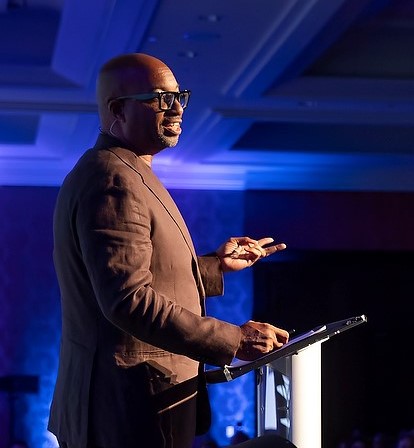
Kwame Alexander
Baratunde Thurston, host of PBS’ “America Outdoors with Baratunde Thurston” and the podcast “How to Citizen,” gave an inspiring talk about democracy and citizenship, weaving in his family history and personal story to accentuate his points. He asked the audience to reimagine the word “citizen” as a verb. “To citizen is to understand and engage with power," he said. “To citizen is to invest in relationships—in ourselves, in others and in the environment. To citizen is to understand and engage with power. To citizen is to participate—to show up.”
Best-selling author Kwame Alexander told his inspiring story of how he became a poet, educator, author, and Newbery Medal-winner for his book “The Crossover,” despite multiple rejections from publishers. He reminded the audience that the mind of an adult begins in the imagination of a child. He said we must nurture children’s vision, while encouraging them to endure the fear of failure so they can scale seemingly impossible heights. Public media must be the vanguard of American culture, he said, bridging the gap between entertainment and education for our children to open up a world of possibility.
The forum culminated with Capital Concerts executive producers Michael Colbert and Jill Jackson, producers of the unifying celebrations of our nation, “The National Memorial Day Concert” and “A Capitol Fourth.” For more than 30 years, the two concerts have been among the highest-rated PBS programs of the year as they bring us together as one family of Americans to reflect on and celebrate our freedom and democratic ideals and to pay tribute to those who defend them.
Colbert and Jackson introduced retired Army General Mark Graham and his wife, Carol, whose one son, Jeff, died during military service in Iraq and another son, Kevin, died by suicide while studying to be an Army doctor. The Grahams are champions of military and civilian efforts to promote mental health and suicide-prevention awareness and thanked PBS for telling their story at the National Memorial Day concert, which prompted a tremendous response from around the country and which they believe saved lives.
The forum ended with a rousing rendition of “Put a Little Love in Your Heart,” by five-time Grammy-Award singer Yolanda Adams, who brought the audience to its feet in a standing ovation.
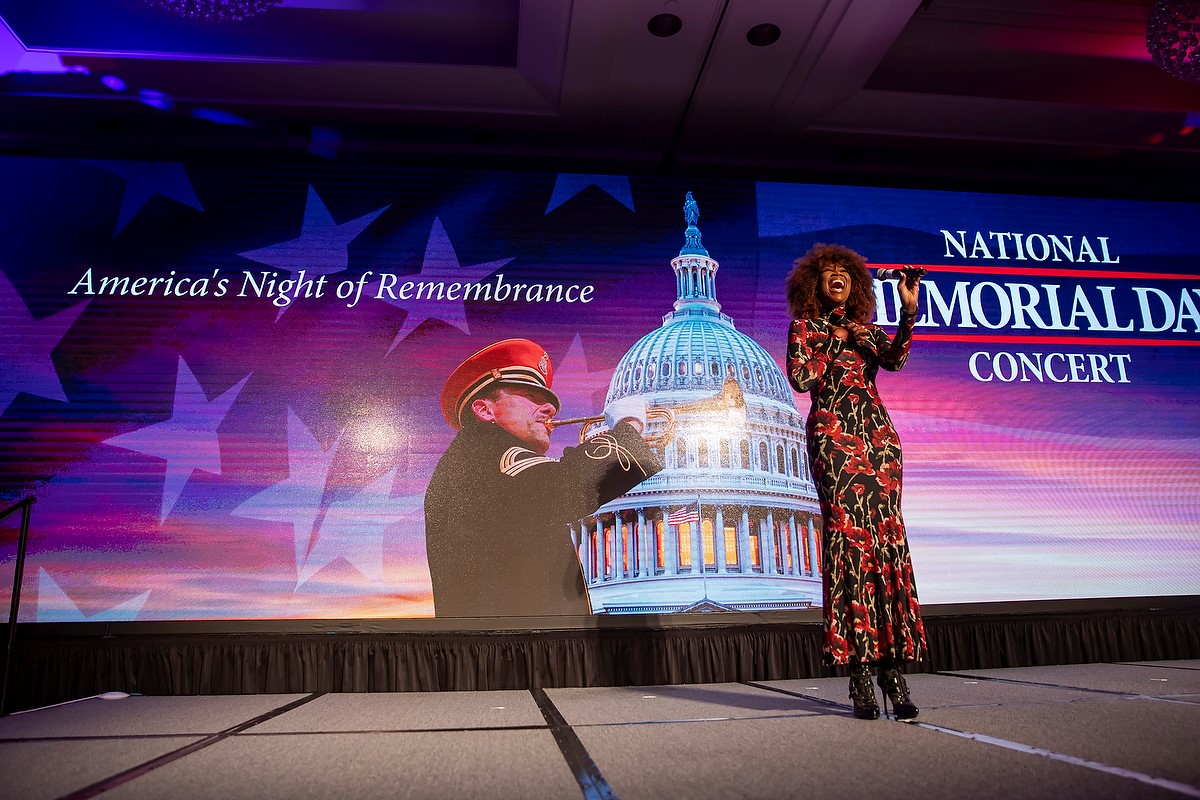
Yolanda Adams sang "Put a Little Love in Your Heart" as a rousing finale.
To subscribe to CPB spotlights, press releases and grant announcements, go to cpb.org/subscribe

